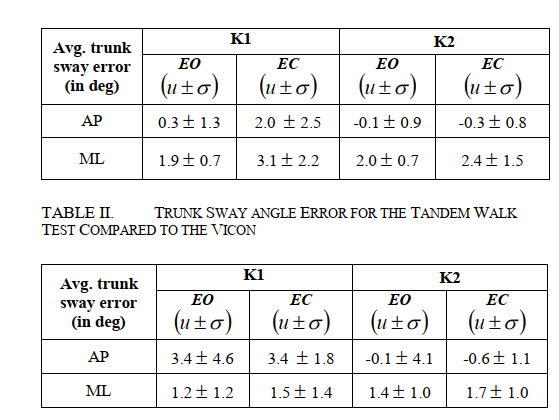Mishra, A.K. et al. (2015). Development and preliminary validation of an interactive remote physical therapy system. 2015 37th Annual International Conference of the IEEE Engineering in Medicine and Biology Society (EMBC), 190-193.: Difference between revisions
| (One intermediate revision by the same user not shown) | |||
| Line 2: | Line 2: | ||
This research focuses on utilizing visual data to predict body movements (especially hip, trunk and joint movements} and then compare it to the actual truth, which was measured by a Vicon motion capture system. The visual data was captured using a K1 and a K2 Kinect, that were made for Xbox 360 and Xbox One respectively. The tests consisted of four types of exercises where the subjects were elderly and were instructed by a remote physical therapist. The error in measuring the two angles anteroposterior (AP) and mediolateral (ML) can be seen in the following table, where (EC) represents “Eyes Closed” and (EO) represents “Eyes Open”: | This research focuses on utilizing visual data to predict body movements (especially hip, trunk and joint movements} and then compare it to the actual truth, which was measured by a Vicon motion capture system. The visual data was captured using a K1 and a K2 Kinect, that were made for Xbox 360 and Xbox One respectively. The tests consisted of four types of exercises where the subjects were elderly and were instructed by a remote physical therapist. The error in measuring the two angles anteroposterior (AP) and mediolateral (ML) can be seen in the following table, where (EC) represents “Eyes Closed” and (EO) represents “Eyes Open”: | ||
[ | [[File:Example68.png]] | ||
As can be seen, the error in degrees was quite small. The paper also concluded that both Kinects are a viable choice for remote physical therapy. | As can be seen, the error in degrees was quite small. The paper also concluded that both Kinects are a viable choice for remote physical therapy. | ||
Latest revision as of 20:44, 1 April 2021
Summary Development and Preliminary Validation of an Interactive Remote Physical Therapy System
This research focuses on utilizing visual data to predict body movements (especially hip, trunk and joint movements} and then compare it to the actual truth, which was measured by a Vicon motion capture system. The visual data was captured using a K1 and a K2 Kinect, that were made for Xbox 360 and Xbox One respectively. The tests consisted of four types of exercises where the subjects were elderly and were instructed by a remote physical therapist. The error in measuring the two angles anteroposterior (AP) and mediolateral (ML) can be seen in the following table, where (EC) represents “Eyes Closed” and (EO) represents “Eyes Open”:
As can be seen, the error in degrees was quite small. The paper also concluded that both Kinects are a viable choice for remote physical therapy.
“At the final test after development was complete, the therapist rated the technical quality of audio and video and the user satisfaction and PT interaction as high as 4.7 and 4.8 out of 5 respectively, based on 17 individual ratings.”
